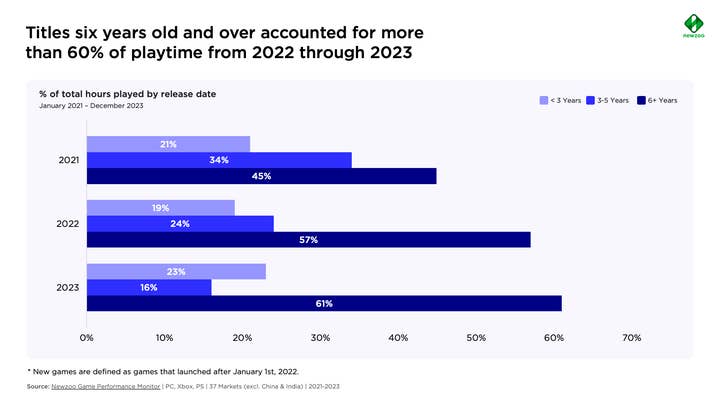Newzoo: There are reasons why the market may still grow
Newzoo's lead analyst Tom Wijman explains why declining playtime and the continued success of older titles doesn't necessarily spell doom for newer games
Newzoo has recently published its PC and Console Gaming Report 2024, providing invaluable insight into the current trends and challenges of the games industry.
And while layoffs and studio closures are the current headlines dominating the news cycle, there are reasons to be optimistic and ways to be successful in the industry, if you apply the right lessons that the current landscape is teaching us.
For instance, Newzoo's lead analyst Tom Wijman points to a trend the data firm highlighted in the report, showing declining playtime. But there's more to it than meets the eye.
"Even though it's declining, a larger share of that smaller pie is going towards games that are over six years old, or older still – so what does that mean in terms of what time is available if you are developing or launching a new game?

"This should, in our opinion, start impacting the choices of monetisation models game developers and publishers are pursuing. Because the fact is, it is extremely difficult to succeed as a live service game that primarily tries to grow by capturing people's time, the logic being that if you get people to play first, then they start spending. And that's just a logical relationship, but what we wanted to show is just how hard it is to get into this market, because you are competing with games that have been successfully grabbing people's attention for over six years, in some cases even over ten years. And those games are not going away, they're actually growing… At the same time, it's not all doom and gloom.
"Within that smaller segment of time, a lot of games are considered very successful. That is still entirely possible, but it does impact what choices to make. And that's the message that we wanted to bring with us."
Wijman says that the share of playtime for newer games was a fraction of the total playtime last year, even among the most successful titles of 2023. Baldur's Gate 3 got 0.6% of the total playtime in 2023, and Starfield got 0.3%, for example.
"Hogwarts Legacy made over $1 billion and got 0.8% [while] Diablo 4, one of the biggest franchises out there, got 1.4%," Wijman continues. "So that's the point that we're trying to make: even though that pie in terms of overall playtime is quite small, there's absolutely a lot of room to be successful within that space. Every year there's room and space for successes. [Helldivers 2] matches that idea of [success] coming out of pretty much nowhere. I don't think the expectations were particularly high for it, but it just hit the right formula at the right time. It got picked up by the right group of players and it became very big."
Newzoo's report highlights a very interesting trend: there is a group of players out there always ready to jump on the next big thing, and thus creating this impression of 'overnight success' for some titles that get amplified through word of mouth particularly. Manor Lords has been the latest in a very long list that would include the likes of Palworld, Helldivers 2, Balatro and more.
"There are these games that don't fit the natural moulds of what will be a success for games," Wijman points out. "They're not in a AAA franchise, they're not made by or published by a AAA studio, they don't have very strong IP backing like a Hogwarts Legacy. Last year you [also] had The Finals, Ready or Not, BattleBit Remastered, these are games that at least for a period of time captured people's attention."

Newzoo looked at whether it was the same people playing these hot new titles as they came out, and could prove that, to a certain extent, it is.
"There is a group of players that are just jumping from hype to hype, and that's actually a very important group if you can reach those people," Wijman says. "The early adopters are very active in their engagement with games media, with talking about games on Reddit and stuff like that – they recommend games to their friends.
"So they can very quickly get the ball rolling. And we looked at what we call 'payer overlap index' – [it] means that if someone bought a game, in this case we looked at Palworld, how much more likely are they to buy other popular games? We looked at Enshrouded, Remnant 2, Party Animals, The Finals, Baldur's Gate 3, Lethal Company, Ready or Not… These are all games that captured that zeitgeist momentarily. And it's massive, it's eight to 16 times more likely that people that bought Palworld also bought some of these games. So there is that group that is moving from big game to big game."
"Even though that pie in terms of overall playtime is quite small, there's absolutely a lot of room to be successful within that space"
These breakout titles all share common characteristics, Wijman adds: they're well made, focused titles that "effectively blur or build on established gameplay," have strong community support, and often fill in gaps left by AAA studios.
"Just thinking of some examples: Baldur's Gate – combat RPGs don't get made by AAA studios anymore. Not for a while. Of course, the last one to be successful with this type of game was Larian Studios as well.
"BattleBit really brought those old school Battlefield vibes, having 64 - 200 players in the same map with vehicles and everything; they brought that. The Finals is an arena shooter, which hasn't really been made for a long time at AAA-level. Palworld did really well, it's a cliché, but [it's] basically Pokémon [and] survival. It's two things that were super popular, they just tied them together. And that's going really well. So there's always some element of taking very established things, especially if they've been left by AAA so you're not competing with them, and then building up on that."
He adds: "Breakout titles, and how they achieve success, even in a tougher market, is very telling."

Going back to the declining playtime trend, Wijman explains that it "does look like we're bottoming out even though we're not at the bottom yet." But in terms of opportunities, he notes that the decline in playtime hasn't fundamentally led to a decline in spending.
"Spending is a bit of a different topic altogether but we're not at the growth that we were during the pandemic. We're not even at the growth that we were pre-pandemic. Back then, games was still a growth market; I would struggle to call it that now.
"But at least, the amount of hours that are leaving gaming are not translated into a similar drop in revenue. So that suggests that the people that are leaving games – or the hours that are leaving games I should say, I don't know if it's people that are leaving or people playing less, probably a bit of both – hasn't really translated to less spending. So the extra hours that people had are going, but they're still spending on games. And that is reassuring."
"The amount of hours that are leaving gaming are not translated into a similar drop in revenue"
The number of players is also still growing, Wijman points out, due to players in emerging markets arriving en force. This is due to wider access to gaming-capable devices, the release of new content, and the emergence of more payment methods that fit local preferences. Wijman adds there are a lot of opportunities to grasp in emerging territories if we "find a better way to serve them," with games that match what they want to engage with and we move away from the same stories games have been telling for so long.
"So those are all reasons to be optimistic, those are real reasons why the market may still grow, despite the last year and despite everything that's happened. Of course, I do have to say, with the amount of layoffs last year, and particularly the fact that it all happened at the same time, a lot of talent will have left the industry altogether.
"I can't say what that means for gaming content in the coming years. But it certainly won't be a positive."
You can download the full PC and Console Gaming Report 2024 on this page for more figures and analysis.
.png?width=720&quality=70&format=jpg&auto=webp)